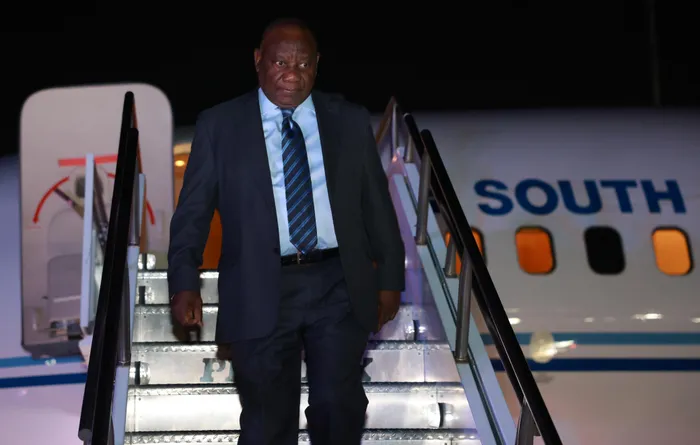President Cyril Ramaphosa urges global solidarity for a two-state solution in the Middle East

In a powerful address at the UN, President Cyril Ramaphosa calls for urgent global action to establish Palestinian statehood and address the humanitarian crisis in Gaza.
Image: GCIS
In a poignant address at the United Nations General Assembly in New York, President Cyril Ramaphosa underscored the pressing need for action in advancing the two-state solution between Israel and Palestine. Speaking during a high-level conference on this significant issue, Ramaphosa expressed that the plight of the Palestinian people and the right to self-determination are central to global ideals of freedom and justice.
“This is a matter of great significance, not only for the people of Palestine, not only for the people of Israel, but for all people who cherish the ideals of freedom and self-determination,” Ramaphosa articulated, highlighting the historical context of UN Resolution 181, which proposed the establishment of two states shortly after the creation of the United Nations. He pointed out that while the state of Israel was established following this resolution, the Palestinian plight has remained unresolved, casting them into a prolonged state of statelessness marked by decades of occupation and, according to the President, an ongoing genocide.
The South African President’s remarks reflect a growing global consensus in favour of recognising Palestine as a sovereign state and affirming the urgent need for a peace process that respects international law. He reinforced South Africa’s unwavering commitment to a contiguous Palestinian state, advocating for its establishment along the pre-1967 borders with East Jerusalem serving as its capital.
Ramaphosa did not shy away from condemning Israel's actions, asserting that the world stands appalled by the violence inflicted upon Gaza, which he described as “brutal acts of genocide” aimed at eradicating the Palestinian presence. He called for an immediate ceasefire, highlighting the severity of humanitarian conditions in Gaza, where reports indicate acute starvation and famine levels among the populace.
As the UN marks its 80th anniversary, Ramaphosa urged member states to act in solidarity with the Palestinian people, pushing forward a global agenda that seeks to address the ongoing humanitarian crisis. He echoed the need for adhering to international law and the necessity for states, including Israel, to acknowledge and act upon their respective obligations.
Among the call to action items, Ramaphosa pointed to several key measures necessary for restoring prospects for peace, including:
- Global recognition of Palestine and its sovereignty.
- An immediate ceasefire and release of hostages and political prisoners.
- Full respect for international law, including adherence to UN resolutions.
- A halt to illegal settlements and the removal of barriers impeding the two-state solution.
- Restoration of humanitarian aid and reconstruction efforts in Gaza.
With the gravity of the situation laid bare, Ramaphosa's appeal was marked by a sense of urgency. “The international community must act now and in unison,” he declared, reinforcing that the future of peace in the region cannot afford to wait. The stakes are high, with millions of lives hanging in the balance as the world watches on.
In closing, President Ramaphosa expressed hope that the momentum generated by the International Conference will steer the collective efforts needed to achieve the long-sought peace, stating, “We must now work together to achieve a just, peaceful, and lasting solution.”
IOL
Related Topics: